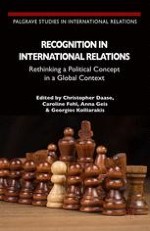2015 | Book
Recognition in International Relations
Rethinking a Political Concept in a Global Context
Editors: Christopher Daase, Caroline Fehl, Anna Geis, Georgios Kolliarakis
Publisher: Palgrave Macmillan UK
Book Series : Palgrave Studies in International Relations
